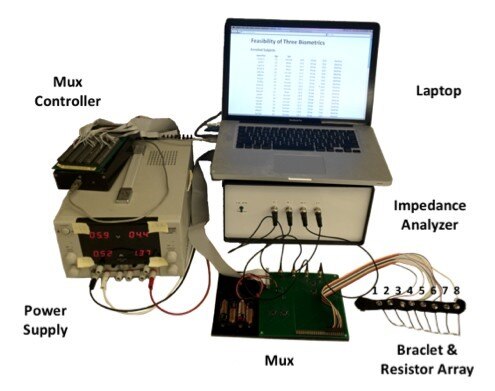Bioimpedance prototype setup (via USENIX)
In a world where we are continuously using more electronic devices, it is becoming increasingly more common to see people using tech to help monitor their health and fitness levels. Some devices used are capable of storing your personal data or uploading the data collected to a database. However, no device currently available possess the ability to recognize its users on its own.
In order to eliminate the burden of keeping track of user's identities, Cory Cornelius, a computer scientist from Dartmouth college, has created a wearable wrist device to identify people using each individual's unique bioimpedance. Due to each person's unique make up of bones, skin, muscles, veins, and arteries — each individual's wrist has their own unique electrical properties.
To construct such a device, the researchers created a custom bracelet, fitted with eight electrodes which send small amounts of alternating current to one another. With a little help from the alternating current version of Ohm's law, the device can recognize which individual is using it through bioimpedance and use that information to possibly categorize and upload data. The device can also be used as a passive security system, which is much more appealing than having to remember security codes and passwords.
To test out their device the team used 46 volunteers and took more than 80 impedance measurements from each one. They found that the device correctly identifies users 80 to 90 percent of the time. This a ways away from traditional identification processes; a fingerprint recognition system only misses one in one thousand times. In addition, the team stated that the system could be combined with a wrist circumference measurement system for improved accuracy. For now, only a prototype exists to prove the idea works. The team states that, in the future, the concept can be integrated into everyday accessories such as watches or bracelets.
Cabe


-

DAB
-
Cancel
-
Vote Up
0
Vote Down
-
-
Sign in to reply
-
More
-
Cancel
Comment-

DAB
-
Cancel
-
Vote Up
0
Vote Down
-
-
Sign in to reply
-
More
-
Cancel
Children